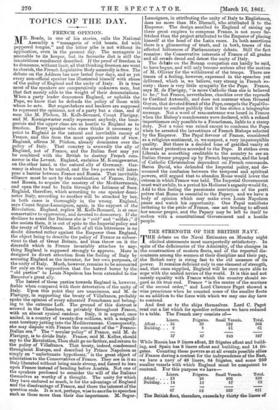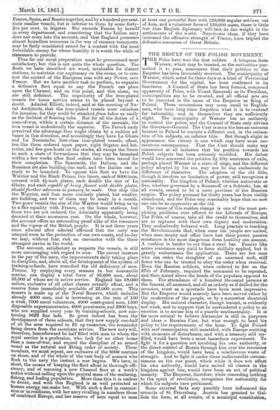THE STRENGTH OF THE BRITISH NAVY.
THE debate on the Naval Estimates on Monday night elicited statements most unexpectedly satisfactory. In spite of the deficiencies of the Admiralty, of the changes in the construction of modern fleets, and of the reported dis- contents among the seamen at their discipline and their pay, the British navy is rising fast to the old measure of its power. It remains deficient only in one element of strength, and, that once supplied, England will be once more able to cope with the united navies of the world. It is this and not merely equality with France which the country should re- gard as its true end. France "is the centre of the marines of the second order," and Lord Clarence Paget showed a wise prescience when he counted some of the smaller fleets as an addition to the force with which we may one day have to contend.
And first as to the ships themselves. Lord C. Paget read out a list which for speedier reference we have reduced to a table. The French navy consists of— Liners. Frigates. Small Vessels. Total.
Afloat. . . . 35 39 192 266 Building. . . 2 8 51. 61 37 47 243 327 While Russia has 9 liners afloat, 23 frigates afloat and build- ing, and Spain has 3 liners afloat and building, and 14 fri- gates. Counting these powers as at all events possible allies of France during a contest for the independence of the East, we have a navy of 46 liners, 84 frigates, and some 250 smaller vessels with which Fngland must be competent to contend. For this purpose we have— Liners. Frigates. Small Vessels. Total.
Afloat. . . . 53 40 505 598 . 14 12 57 83 67 52 562 681 The British fleet, therefore, exceeds by thirty the liners of France, Spain, and Russia together, and by a hundred per cent. their smaller vessels, but is inferior to them by some forty- five per cent. in frigates. She exceeds France by herself in every department, and considering that the Indian navy does not come into the account, and that England possesses almost boundless resources in the way of steamer transports, may be fairly considered armed for a contest with the most formidable enemy for whose hostility it is worth the while of statesmen to provide.
Thus far our naval preparation must be pronounced most satisfactory, but this is not quite the whole question. The fleets we have described are wood, invaluable for distant stations, to maintain our supremacy on the ocean, or to con- test the control of the European seas with any- Power, save France. But we have another task to perform, to organize a defensive fleet equal to any the French can place upon. the Channel, and on this point, and this alone, we are still deficient. The superiority of the iron-plated vessels for home service seems to be placed beyond a doubt. Admiral Elliott, indeed, said at the meeting of Na- val Architects, that the iron-plated vessels were valueless for invasion, for they could be attacked from below as easily as the feeblest of floating tubs. But for all the duties of a man-of-war, within a certain distance of the arsenals, the iron vessel is undoubtedly the superior. The French early perceived the advantage they might obtain by s sudden ad- vance in this direction' and accordingly they have La Gloire and La Normandie, first-class iron-plated vessels, afloat, ten like them ordered upon paper, eight frigates and bat- teries, and five gun-boats on the stocks, all except the liners in such a state of forwardness that they may be launched within a few weeks after final orders have been issued for their completion. The Spaniards, the Italians, and the Russians are also building one each, and the Italian one is ready to be launched. To oppose this fleet we have the Warrior and the Black Prince, two liners, each of 6000 tons, covered with 4i-inch plates, each double the size of La Gloire, and each capable of being fenced wit/i double plates, should further advances in gunnery be made. One ship like the Warrior, and four more similarly plated, but smaller, are building, and two of them may be ready in a month. Two pore vessels the size of the Warrior would bring us up to a fair equality with France, on the home stations, but these two are not ordered, the Admiralty apparently being daunted at their enormous cost. On the whole, however, the account offers an astounding proof alike of the resources and the vigour of the British people. It is not three years since admiral after admiral affirmed that the navy was unequal even to the protection of our own coasts, and to-day we may, without fear, risk an encounter with the three strongest navies in the world.
The account, satisfactory as respects the vessels, is still more encouraging with regard to men. The recent increase in the pay- of the navy, the improvements daily taking place in discipline, and, above all, the development of the system of training-schools, have remedied the old deficiency of men. France, by employing every seaman in her mercantile marine, can display a total force of 85,000 men, about -35,000 of whom are in active service. England has 38,000 sailors, exclusive of all other classes actually afloat, and a reserve force immediately available of 25,000 more. This reserve is made up of the Naval Reserve, which includes already 4000 men, and is increasing at the rate of 100 a week, 7000 naval volunteers, 4000 coast-guard men 1500 disposable supernumeraries, 4000 pensioners, and 2906 boys, who are supplied every year by training-schools, now con- taining 9639 fine lads. So great indeed has been the development of these schools that they now supply one-half of all the men required to fill up vacancies, the remainder being drawn from the merchant service. The new navy will, therefore, henceforward be half filled with men to whom the royal service is a profession, who look for no other home than a man-of-war, and regard the discipline of an armed vessel as the natural and fitting order of society. These numbers, we must repeat, are exclusive of the 8000 marines on shore, and of the whole of the vast body of seamen who flock to the navy the instant a war begins. We have, in short, the means of keeping the fleet afloat in thorough effi- ciency, and of manning a new Channel fleet at a week's notice without calling upon the general mass of the seafaring, fishing, and loafing population. More than this it is useless to desire, and with this England is as well protected as human energy can make her. With such a fleet in commis- sion or in readiness, with her navy rivalling in numbers those of combined Europe, and her reserve of men equal to man at least one powerful fleet with 120,000 regular soldiers out of Asia, and a volunteer force of 150,000 more, there is little fear that English diplomacy will lack its due weight in the settlements of the world. Napoleonic ideas, if they have increased the offensive strength of France, have tripled the defensive resources of Great Britain.































 Previous page
Previous page